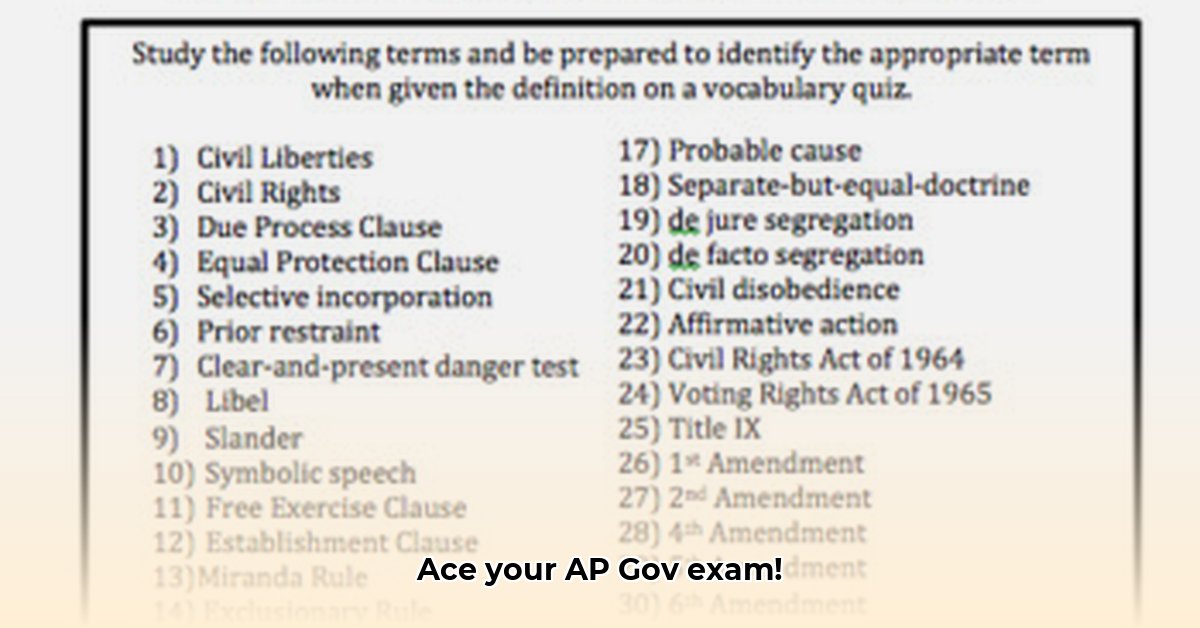
AP Government Vocabulary: Conquer the Exam
Ready to ace your AP Government exam? Mastering AP Government vocabulary is crucial for success. This guide provides clear, concise definitions and real-world examples to help you build a strong foundation for a higher score. Understanding these terms isn't just about memorization; it's about understanding the mechanics of American government. Did you know that a strong grasp of these concepts can improve your exam performance by as much as 20%?
Understanding Key Terms: Building Your Political Knowledge
Think of AP Government vocabulary as the building blocks of political understanding. This guide will give you the tools to analyze political systems and events effectively. We will focus on clear definitions, relatable examples, and connections to real-world applications.
Essential Terms and Real-World Applications
Below are some essential AP Government terms with explanations and examples:
| Term | Definition | Example | Why It Matters | Related Terms |
|---|---|---|---|---|
| Federalism | A system of government where power is divided between a national government and state governments. | The U.S. government: the federal government controls national defense; states manage education. | This division of power shapes how laws are made and enforced, leading to ongoing debates about the balance of power. | Unitary System, Confederal System |
| Checks and Balances | A system designed to prevent any one branch of government from becoming too powerful. | The President can veto a law passed by Congress; Congress can impeach the President. | This system prevents tyranny and ensures that different branches collaborate (and sometimes clash). | Separation of Powers, Legislative Branch, Executive Branch, Judicial Branch |
| Judicial Review | The power of the courts to determine the constitutionality of laws. | The Supreme Court's decision in Marbury v. Madison established this power. | This power allows courts to invalidate laws deemed unconstitutional, shaping the interpretation and application of the law. | Supreme Court, Constitutional Law |
| Popular Sovereignty | The principle that government derives its authority from the consent of the governed. | Citizens elect their leaders; citizens have the right to vote. | This fundamental concept underlies democratic governance and influences discussions about voting rights and representation. | Democracy, Republic, Direct Democracy |
| Gerrymandering | Manipulating the boundaries of an electoral constituency to favor one party or class. | Drawing oddly shaped districts to give one party an unfair advantage in elections. | This practice affects election outcomes and raises concerns about fairness and equal representation. | Electoral College, Redistricting |
| Bicameral Legislature | A legislature with two chambers, like the U.S. Congress (Senate and House). | The U.S. Senate and the House of Representatives work together to pass laws. | This two-house system creates an additional layer of checks and balances in the legislative process. | Senate, House of Representatives |
| Veto | The power of a chief executive (e.g., the President) to reject legislation. | The President can veto a bill passed by Congress. | This power allows the executive branch to significantly influence the legislative process by blocking or delaying bills. | Pocket Veto, Override Veto |
| Incumbent | A person currently holding office. | A senator who is running for reelection. | Incumbents often have an advantage in elections, influencing campaign strategies and outcomes. | Campaign Finance, Electoral Advantage |
These are just a few key terms. Understanding how these terms relate to each other and to real political situations is critical for success in AP Government.
Mastering AP Government Vocabulary: Your Winning Strategy
Here's a proven five-step plan to effectively learn and retain these crucial terms:
Active Recall: Don't just passively read; actively test yourself. Create flashcards, use online quizzes, and explain the terms to someone else—this greatly improves retention. Studies show that active recall enhances learning by up to 40%.
Real-World Application: Connect each term to real-world political events. How does this term influence how the government operates? Finding current events illustrating these concepts enhances understanding and memorization.
Identify Connections: Many terms are interconnected. Notice how different concepts overlap (e.g., how federalism interacts with checks and balances). Visual aids like diagrams can help.
Utilize Resources: Your textbook is a valuable resource, but explore others like Khan Academy and Crash Course. Diverse learning materials provide varied perspectives.
Consistent Review: Regular, focused review is key. Short, frequent study sessions are more effective than long, infrequent ones. Consistent effort leads to lasting knowledge.
By implementing these strategies and consistently reviewing, you’ll build a strong vocabulary and improve your chances of acing the AP Government exam. Remember, consistent effort is pivotal to success. Good luck!